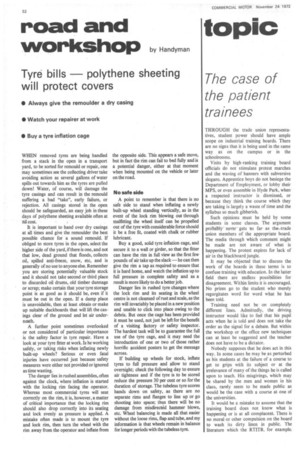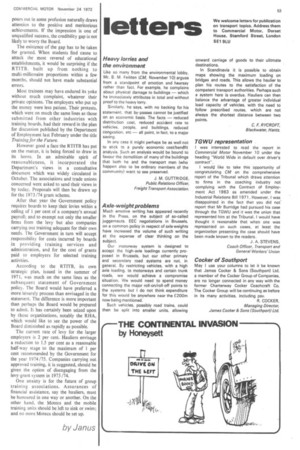topic
Page 48

Page 49

If you've noticed an error in this article please click here to report it so we can fix it.
The case of the patient trainees
THROUGH the trade union representatives, student power should have ample scope on industrial training boards. There are no signs that it is being used in the same way as on the campus or in the schoolrooms.
Visits by high-ranking training board officials do not stimulate protest marches and the waving of banners with subversive slogans. Apprentice boys do not besiege the Department of Employment, or lobby their MPS, or even assemble in Hyde Park, when a respected instructor is dismissed, or because they think the course which they are taking is largely a waste of time and the syllabus so much gibberish.
Such opinions must be held by some students in some classes. The argument probably never gets as far as the trade union members of the appropriate board. The media through which comment might be made are not aware of what is happening. The protest expires for lack of air in the blackboard jungle.
It may be objected that to discuss the work of the boards in these terms is to confuse training with education. In the latter field there are endless possibilities for disagreement. Within limits it is encouraged. No prizes go to the student who merely regurgitates word for word what he has been told.
Training need not be on completely different lines. Admittedly, the driving instructor would like to feel that his pupil acts when he is told and does not take the order as the signal for a debate. But within the workshop or the office new techniques can at least be suggested and the teacher does not have to be a dictator.
Nobody supposes that he does act in this way. In some cases he may be as perturbed as his students at the failure of a course to get to grips with its subject or at the irrelevance of many of the things he is called upon to teach. His misgivings, which may be shared by the men and women in his class, rarely seem to be made public as would be the case with a course at one of the universities.
It would be a mistake to assume that the training board does not know what is happening or is at all complacent. There is no moral or other compulsion on the board to wash its dirty linen in public. The literature which the RTITB, for example.
pours out in some profusion naturally draws attention to the positive and meritorious achievements. If the impression is one of unqualified success, the credibility gap is not likely to worry the Board.
The existence of the gap has to be taken for granted. When students find cause to attack the most revered of educational establishments, it would be surprising if the RTITB, built up from nothing to multi-millionaire proportions within a few months, should not have made substantial errors.
Most trainees may have endured its yoke without much complaint, whatever their private opinions. The employers who put up the money were less patient. Their protests, which were on much the same lines as those submitted from other industries with training boards, had their reward in the plan for discussion published by the Department of Employment last February under the title Training for the Future, However good a face the RT1TB has put on the matter, it is being forced to draw in its horns. In an admirable spirit of reasonableness, it incorporated the Department's views in a consultative document which was widely circulated in October, The associations and trade unions concerned were asked to send their views in by today. Proposals will then be drawn up for the 1973/74 grant scheme.
After that year the Government policy requires boards to keep their levies within a ceiling of 1 per cent of a company's annual payroll; and to exempt not only the smaller firms from the levy but also companies carrying out training adequate for their own needs. The Government in turn will accept responsibility for costs incurred by boards
in providing training services and administration, and for the cost of grants paid to employers for selected training activities.
According to the RTITB, its own strategic plan, issued in the summer of 1971, was much on the same lines as the subsequent statement of Government policy. The Board would have preferred a more leisurely process than envisaged in the statement. The difference is more important than perhaps the Board would be prepared to admit. It has certainly been seized upon by those organizations, notably the RHA, which would like to see the power of the Board diminished as rapidly as possible.
The current rate of levy for the larger employers is 2 per cent. Hauliers envisage a reduction to 1.5 per cent as a reasonable half-way stage to the maximum of 1 per cent recommended by the Government for
the year 1974/75. Companies carrying out approved training, it is suggested, should be given the option of disengaging from the levy-grant system in 1973 /74.
One anxiety is for the future of group traininE„, associations. Assurances of financial assistance, say the hauliers, must be honoured in one way or another. On the other hand, the Motecs and the mobile training units should be left to sink or swim; and no more Motecs should be set up.
by Janus












































































































